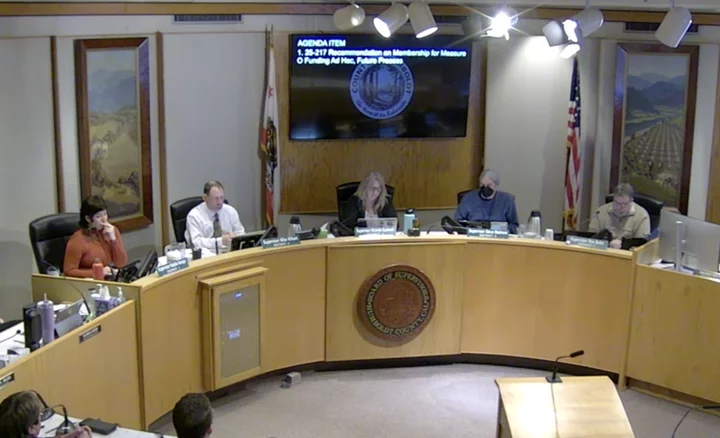The Humboldt County Board of Supervisors (from left): Fourth District Supervisor Natalie Arroyo, Third District Supervisor Mike Wilson, Second District Supervisor and Board Chair Michelle Bushnell, Fifth District Supervisor Steve Madrone and First District Supervisor Rex Bohn.
###
Back in November, more than 63 percent of Humboldt County voters approved Measure O, aka the “Humboldt County’s Roads/911 Emergency Response Measure,” ushering in a new 1 percent sales tax countywide (including within our incorporated cities).
The measure is expected to generate $24 million per year, and on Tuesday, the Humboldt County Board of Supervisors debated how to prioritize spending those revenues, with First District Supervisor Rex Bohn advocating hard for spending the vast majority — if not all — of it on road repairs, rather than public transit.
“Our roads absolutely suck right now,” Bohn said at one point in the meeting. He said he regularly gets calls from constituents complaining about potholes and the general state of disrepair of county roadways, “but I don’t get any calls on transit.”
Other supervisors — particularly Fourth District representative Natalie Arroyo and Third District representative Mike Wilson — said that while roads should certainly get the biggest chunk of Measure O revenues. public transit initiatives deserve a cut, too.
Such spending decisions will need to be made each year, and Tuesday’s board discussion also focused on reviewing the process for those future deliberations, which will involve oversight and input from an audit committee, technical committees, county department heads and the Humboldt County Association of Governments (HCAOG).
Way back in July, when the board unanimously agreed to put Measure O on the ballot, it promised to appoint a “Funding Workgroup,” or ad hoc committee, with representatives from the county (including two supervisors, the Public Works director and someone from the County Administrative Office) as well as outside agencies such as HCAOG, the Humboldt Transit Authority and the McKinleyville Community Services District.
The recommendation presented by staff on Tuesday also called for the inclusion of representatives from the the Building and Construction Trades Council of Humboldt and Del Norte Counties and the Humboldt Builders’ Exchange. Wilson questioned this late addition.
“What expertise do those organizations bring to this discussion in terms of how we allocate community funding — prioritizing where transportation dollars get spent?” he asked. “Like, what’s that about?”
County Administrative Officer Elishia Hayes said it’s entirely up to the board, who gets put on this committee, and it will ultimately be up to the board alone to make allocation decisions. The ad hoc committee, which is only scheduled to meet one more time before the first spending decisions are made, will only set broad expectations, she said.
Wilson remained hesitant.
“I agree with you that the ad hoc [committee] is not necessarily super deep, but it’s still a vibe,” he said.
Fifth District Supervisor Steve Madrone said the group’s directive will be limited to recommending how to split revenues between transit and roads, “nothing more.” By way of example he threw out some hypothetical percentages — 20 or 30 percent to transit, or maybe 60 or 70 percent to roads.
The prospect of giving that much to transit — even hypothetically — appeared to irk Bohn. He noted that local transit agencies have received close to $35 million in grants over the past year and suggested that road repairs should be a much higher priority.
“I have roads failing everywhere; [Second District Supervisor] Michelle [Bushnell] has roads failing everywhere,” Bohn said, referring to conditions in their respective districts. He argued that the Measure O sales pitch to voters focused heavily on roads. “Our roads are terrible,” he said.
Madrone and Bushnell have been the county’s representatives on the Measure O ad hoc committee thus far. Madrone asked to continue serving in that role, and he described himself as an advocate for both roads and transit. He advocated spending “an appropriate level” of Measure O revenues on transit, suggesting perhaps 20 percent.
“We got a lot of money to work with,” he said. “We’ll figure it out.”
Wilson said that, unlike Bohn, he has heard constituents advocate for improved public transit, with public polling reflecting that interest.
Bohn, clearly frustrated, stuck to his guns, saying roads should receive all or nearly all of the funding for at least the next three years. In his view, that’s what voters wanted when they passed Measure O.
“I’m just saying, can we just agree to spend the money where we said we were going to spend it, instead of diverting it?” Bohn said. “What I’m saying is our roads are bad, and I think people jumped on this because our roads are bad.”
Fourth District Supervisor Natalie Arroyo replied, “I am absolutely in favor of the vast majority of this going to road repairs,” though she added that, as both the chair of the Humboldt Transit Authority and the board’s representative for most of the City of Eureka, she’s heard from many people who voted for Measure O because of its inclusion of public transit funding.
Bushnell wound up making a motion to appoint the staff-recommended list of people to the ad hoc committee, though she suggested replacing herself with Wilson as the board’s representatives. The motion passed 4-1, with Bohn dissenting.
Before the vote, Bohn argued his position one more time. “I want transit to be funded … ,” he said, “but our roads are failing, and they’re going to do nothing but get worse if we don’t do anything.”

CLICK TO MANAGE